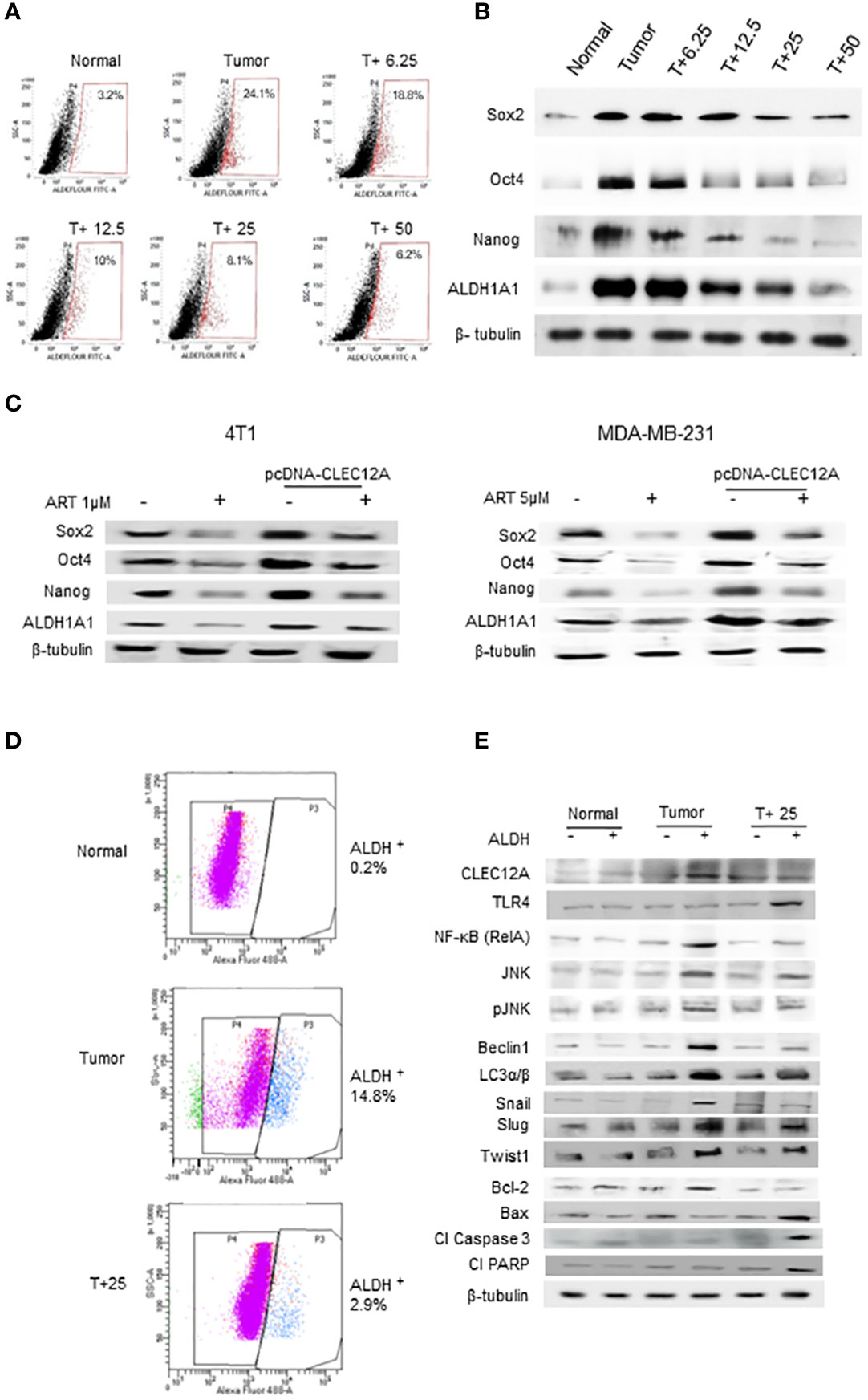- 1Cancer Research Laboratory, Department of Zoology, University of Calcutta, Kolkata, India
- 2Cell Biology Laboratory, Department of Microbiology, University of Calcutta, Kolkata, India
- 3Department of Zoology, Charuchandra College, Kolkata, India
- 4Centre for Research in Nanoscience and Nanotechnology, University of Calcutta, Kolkata, India
by Chatterjee R, Shukla A, Chakrabarti K and Chatterji U (2023) Front. Oncol. 13:1242432. doi: 10.3389/fonc.2023.1242432
In the published article, there was an error in Figure 6 as published. In Figure 6E, multiple β-tubulin blots were incorporated erroneously in between the immunoblot panel. The relative protein expressions in this panel were estimated to their respective β-tubulin expressions at the end of the panel only. The corrected Figure 6 and its caption appear below.

Figure 6 Artemisinin targets the cancer stem cell population in mammary tumors and breast cancer cell lines. (A), Aldefluor assay revealed a 7.5-fold increase in the CSCs in mice tumors compared to normal tissues. ART treatment reduced the percentage of ALDH+ cells in a dose-dependent manner, by almost 4-fold in the 50 mg/kg treated mice (p<0.01). (B), Expressions of CSC markers (Sox2, Oct4, Nanog and ALDH1A1), determined by western blot analyses, revealed a dose-dependent reduction in response to ART treatment compared to the untreated tumor. (C), Expressions of CSC markers were elevated in CLEC12A-overexpressed 4T1 and MDA-MB-231 cells compared to the non-overexpressed cells. ART treatment reduced expression of CSC markers in CLEC12A-overexpressed cells, but comparatively less as that observed in ART-treated non-overexpressed cells. (D), Cancer cells (ALDH-) and CSCs (ALDH+) were sorted from normal mammary tissues, untreated tumors and tumors from mice treated with 25 mg/kg body weight of ART. A 5-fold (p<0.01) reduction was observed in CSCs after ART treatment. (E), Relative protein expressions of CLEC12A, TLR4, NF-kB, JNK/pJNK, and proteins related to autophagy, EMT and apoptosis were compared in the cancer cells versus CSCs in the sorted cell populations. Expression of CLEC12A, NF-kB (RelA), JNK/pJNK, Beclin1 and LC3α/β, Snail, Slug and Twist1 were conspicuously high in the ALDH+ population, whereas that of TLR4 and apoptotic markers were low compared to the ALDH- population. Expressions of all the above were reversed on ART treatment, specifically in the ALDH+ population. Relative protein expressions were normalized with β-tubulin.
The authors apologize for this error and state that this does not change the scientific conclusions of the article in any way. The original article has been updated.
Publisher’s note
All claims expressed in this article are solely those of the authors and do not necessarily represent those of their affiliated organizations, or those of the publisher, the editors and the reviewers. Any product that may be evaluated in this article, or claim that may be made by its manufacturer, is not guaranteed or endorsed by the publisher.
Keywords: Clec12A, artemisinin, TLR4, autophagy, apoptosis, cancer stem cells
Citation: Chatterjee R, Shukla A, Chakrabarti K and Chatterji U (2024) Corrigendum: CLEC12A sensitizes differentially responsive breast cancer cells to the anti-cancer effects of artemisinin by repressing autophagy and inflammation. Front. Oncol. 14:1393626. doi: 10.3389/fonc.2024.1393626
Received: 29 February 2024; Accepted: 04 March 2024;
Published: 14 March 2024.
Edited and Reviewed by:
Nitin Telang, Palindrome Liaisons Consultants, United StatesCopyright © 2024 Chatterjee, Shukla, Chakrabarti and Chatterji. This is an open-access article distributed under the terms of the Creative Commons Attribution License (CC BY). The use, distribution or reproduction in other forums is permitted, provided the original author(s) and the copyright owner(s) are credited and that the original publication in this journal is cited, in accordance with accepted academic practice. No use, distribution or reproduction is permitted which does not comply with these terms.
*Correspondence: Urmi Chatterji, dXJtaWNoYXR0ZXJqaUBnbWFpbC5jb20=
 Ranodeep Chatterjee
Ranodeep Chatterjee Aditya Shukla2
Aditya Shukla2 Urmi Chatterji
Urmi Chatterji